An outstanding performance by Inveraray & District Pipe Band earned them the deserved title of Grade 1 British Pipe Band Champions 2016, writes Editor Robert Wallace
In second came Field Marshal Montgomery, placed first by both piping judges but whose sixth in drumming cost them dear. That said, I think that with this level of playing only the most churlish would have denied Inveraray their reward.
After their performance there were, not surprisingly, broad smiles on the faces of the Inveraray pipers and drummers led by P/M Stuart Liddell and L/D Steven McWhirter.
For me there were four bands in contention for the Grade 1 title: the two already mentioned plus St Laurence O’Toole and Shotts and Dykehead the current World Champions. Behind them I had Boghall and Bathgate and Glasgow Police. However the actual result in Grade 1 was :
1 Inveraray & District (pictured top during their performance)
2 Field Marshal
3 St Laurence O’Toole
4 Scottish Power
5 Spirit of Scotland
6 Shotts
Drumming: Inveraray
The competition was staged at the St James Playing Fields near Paisley and Glasgow Airport and occasionally the noise from jet engines could be heard mingled with that of some of the 147 bands that had entered for the first major of the season. The weather was dry for the most part but with a few heavy, blustery showers. Bands on near the end of the day had the best of it.
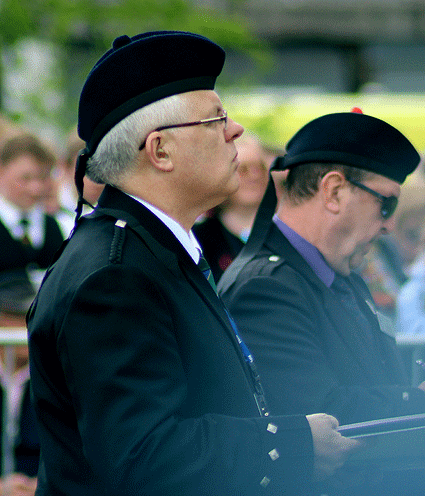
Eleven played in Grade 1 with Cullybackey from Northern Ireland surprising call offs. On judging duty for the first time at a major championship in this country was P/M Terry Lee from Vancouver. He was joined by James Baxter (ensemble), Ian Wood (piping) and Paul Turner (drumming).
The Grade 4 arena was rather close to Grade 1 with a particularly loud bass-driven set of speakers meaning that announcements there bled into the lugs of those of us trying to listen as closely as we could to the latter.
I took up a position downwind of the competing circle (we can do better!) and was joined by a number of knowledgeable individuals from the piping and pipe band worlds like me, keen not to miss a gracenote. I remind readers that comments I make are with this proviso: the adjudicators in the centre are much better placed to hear the bands than we mere scribes on the outer fringes.
First on were Field Marshal and I found it very hard to fault their playing or their sound. Were they a tad lacking in confidence; could they have pushed the tempi a smidgen? Safety first is not something one associates with Richard Parkes’ band but after a chastening few runs maybe they were a little cautious, especially in the strathspeys. Beautiful fingering and perfect unison.
Fife Police started well but there was a suspicion of flatness in B and low G and the bottom hand work in the reels, birls and B strikes, did not come across with any unified acuity. The concluding jigs were definitely laboured. An interesting medley however, but needing more hard work.

Vale of Atholl had a thin sound compared to Fife and there was unsteadiness on D particularly so at the intro into the slow air. This band played very well with good rhythm and fingering (pipers well-schooled) but the sound needs an overhaul. Moreover, the reels in this particular medley are of questionable vintage.
The revived Spirit of Scotland had the misfortune of playing through the worst weather of the day. They stuck to their task manfully though, and for a first outing after several years lay-off more than justified their Grade 1 ranking. This band comprises some of the best players in the world, yet the pipe corps needs a dose of seriously hard graft if they are to get the required precision and clarity of finger into their combined technique. On this occasion a second place for the remarkable Jim Kilpatrick and his drum corps compensated.
I thoroughly enjoyed the medley from St Laurence O’Toole, though there were grumbles around me about the Es and Fs on their chanters. I must say I didn’t notice it. Their music fairly tramped along complimented by the comforting envelope of a warm drone tone and cultured coaxing from the drummers. There was a definite contrast in technique between them and SoS. SLoT’s slow air was one of the highlights of the day.
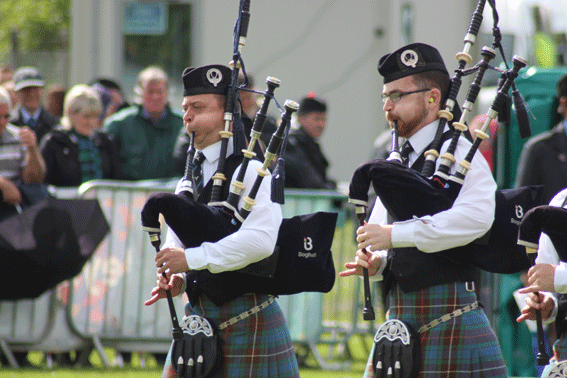
Two good runs followed. The first from Boghall & Bathgate under new P/M Ross Harvey. A solid drone tone may have hidden an F and high A which were shaky on occasions. Then the sun came out and the Boggies respond with fine playing if a little constrained in the jigs and reels.
The second came from Glasgow Police. Like the curate’s egg, the medley was good in parts. Cabar Feidh just didn’t cut it (over complex, suspect harmony) but then with Alick C MacGregor the Polis sounded like a different band. The strathspeys were weak melodically and laboured in delivery. Very good sound, nicely set chanters with good projection.
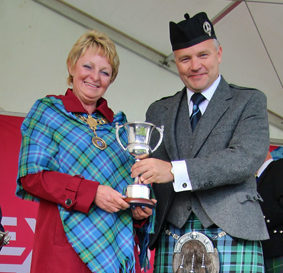
On came Inveraray. Initially the chanters seemed very high pitched but after a razor-sharp intro, the ear adjusted and with the playing right on the edge, you knew this was a band in magnificent form. Afraid of no one, they seized the day in great style with a medley that just worked from start to finish, the break/ bridge to the Jig of Slurs as striking as the sun can be on those white-fronted buildings in the eponymous town. Next to their name in my notebook is a large asterisk and the words ‘First Prize’.
Bleary from Northern Ireland had the difficult task of following on and they gave a good account despite some shortcomings. I felt their drones drifted and their fingers suffered by comparison with Stuart Liddell’s superheroes. The jigs were stodgy – surprising in an Irish band – and need to be given more of a free rein. Overall an enjoyable band to listen to but a large gulf to cross before they are in a position to challenge the big beasts in the grade.
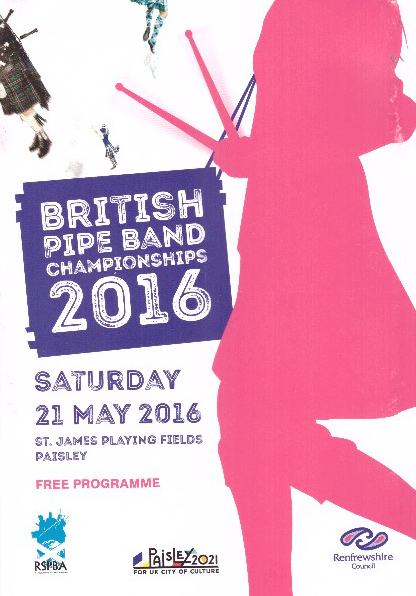 Scottish Power got better as their performance went on but never really recovered from a shaky start where the low Gs and B harmonies clashed throughout the opening tune. The slow air went on a shade too long and there was absolutely no melody whatsoever in the first jig – the harmony did not help. Much of their fingerwork was very impressive however (particularly on the bottom hand) and with a few adjustments to the medley this band can do much better.
Scottish Power got better as their performance went on but never really recovered from a shaky start where the low Gs and B harmonies clashed throughout the opening tune. The slow air went on a shade too long and there was absolutely no melody whatsoever in the first jig – the harmony did not help. Much of their fingerwork was very impressive however (particularly on the bottom hand) and with a few adjustments to the medley this band can do much better.
An excellent performance from Shotts & Dykehead rounded off the day. The tone was clean and clear, the tempi where they needed to be – apart from the strathspeys which I would have preferred just a little nippier – and the breaks slick and very professionally handled. I don’t know enough about drumming to comment specifically, but the new corps did not seem in any way out of place, working closely with the pipers, adding to the rhythm and dynamics of Shotts’ fine ensemble. Very surprised to see they only managed sixth.
Overall a good start to the Grade 1 band season. It all augurs well for the rest of the summer and I believe the odds on the Worlds will have altered somewhat after the British at Paisley. On now to the UKs in Belfast where the real trends will begin to emerge.
Other results: Champions in the new Novice B category were Lochgelly High School from Fife. Novice A went to Dollar Academy, 4b to Clontibret from Eire, 4a to City of Inverness, Juvenile to Dollar Academy, 3b to Prestonpans RBL, 3a to Aughintober, 2 to Police Service Northern Ireland.
Get the full list of prizewinners and summaries from the RSPBA here. More from the British Championships to follow later.







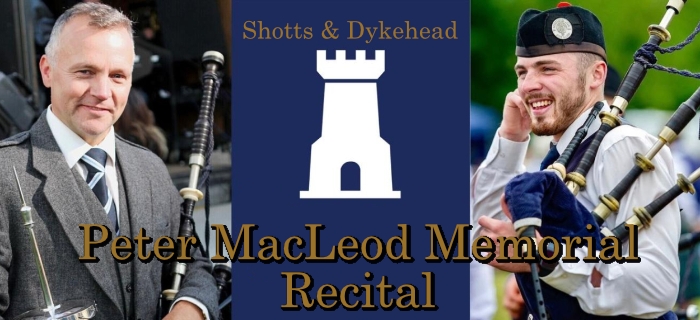









Recent Comments